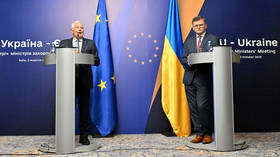Reason for Swedish minister’s absence from Ukraine meeting revealed
Foreign Minister Tobias Billstrom reportedly forgot his passport and could not travel to the summit in Kiev
Swedish Foreign Minister Tobias Billstrom forgot his passport and could not enter Ukraine for an EU Council summit in Kiev, Austrian newspaper Die Presse reported on Monday. Several European ministers skipped the meeting, which saw the bloc offer “solidarity” – but no new military aid – to Ukraine.
Without his passport, Billstrom was forbidden from crossing the Poland-Ukraine border on Monday for a meeting of EU foreign ministers in Kiev later that day, Die Presse reported, citing diplomatic sources.
Billstrom missed out on an eight-hour train journey to the Ukrainian capital for a largely symbolic gathering. Although the summit was historic in that it marked the first time that the EU Council has ever met outside of the union’s borders, it delivered little in the way of concrete assistance for Ukraine.
In a statement after the gathering, EU foreign policy chief Josep Borrell announced that member states would attempt to agree on a €5 billion ($5.2 billion) arms package for Ukraine next year, and would contribute €50 billion in economic aid, if internal disagreements within the bloc can be overcome.
In the meantime, the summit “sent a strong message of solidarity and support to Ukraine,” Borrell said.
Billstrom was not the only foreign minister to skip the meeting. Polish FM Zbigniew Rau sent his deputy, Wojciech Gerwel, in his place, telling Polish media that an ongoing spat between Warsaw and Kiev over grain imports had “shaken” the trust between the formerly close partners.
Hungarian Foreign Minister Peter Szijjarto also sent a deputy in his place. Budapest has forbidden the transfer of weapons to Ukraine via Hungarian territory, has repeatedly called for a ceasefire and peace deal between Moscow and Kiev, and opposes economic sanctions on Russia. Hungary has also maintained its veto on a €500 million arms package for Kiev since May.
“The more weapons we supply – the more people will die, the longer the war will continue and the greater the destruction will be. And the more sanctions packages we adopt, the more we destroy European competitiveness,” Szijjarto told the Hungarian newspaper Magyar Nemzet on Tuesday.
Latvian Foreign Minister Krisjanis Kariņs also missed Monday’s summit due to illness.
You can share this story on social media:








Comments are closed.